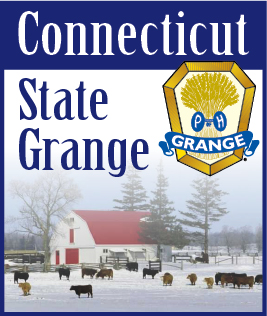 |
|
 |
|
 |
|
 |
 |
| National Grange News |
|
 |
The State of Action Grange |
| |
By Ed Luttrell, National Master/President |
| |
JUNE 2008 --
Action Grange is dead; no it’s alive; no it’s ???
The reality is that every Grange is an action Grange, every Grange is a regular Grange.
The action Grange program was initiated in 1999 as a fiveyear experiment that would allow a group of Granges to try new things outside our rules to see if that would help them grow. They were provided with training on elements that should help Grange members make a positive difference in our organization and in their communities.
As all experiments go, there were some Granges that bought into the program completely, some that rejected it, and most had a mixed reaction to it. The delegates had reports on the progress every year at National Grange Session and responded to those reports.
Over the last seven years the National Grange delegates have made a number of changes to our organization. None of these changes were huge and earthshaking, but they were noticeable to many of our members. The list follows:
- In 2003, the Executive Committee may be titled Board of Directors.
- Subordinate Granges may be referred to as Community Granges. The terms are interchangeable and your Grange can use either.
- The Annual Word is optional at the Subordinate and Pomona divisions of the Order.
- The Alternative Manual was approved.
- In 2004, Alternative officer titles were approved. Master/ President, Overseer/Vice-President, Lecturer/Program Director, Gatekeeper/Greeter are to be considered interchangeable. Your Grange can use either or both.
- The Welcoming Ceremony was adopted and included as a method of receiving new members.
- In 2006, two study committees were formed to look at both the manual and updating the degree and installation ceremonies.
There were many lessons learned by our members and leaders as we progressed through the program. Those benefits were learned by Community Granges and by the National Grange. Our National Grange departments focused even more strongly on training and communication, both of these being an ongoing process. The lessons learned were:
Evaluation: Many things were learned by our organization by our members going through the process of evaluation which was the key to the action Grange program. The most important lesson is that we must regularly and consistently evaluate what our members want and need from the Grange and what our communities need that we can provide. We can not assume we know, we must ask questions and listen
to the answers. Then we can incorporate those ideas into our Grange program. Our programs will always be adapting to meet the needs of our changing membership.
Pride, ownership, and the resulting excellence: We can not be successful unless we have and exhibit our pride in the Grange and its activities. Pride and enthusiasm are created when our members have ownership in the programs and projects of their Grange. It is when people see high quality and a standard of excellence that they want to become part of the Grange.
Teamwork: One lesson that was reinforced was the importance of team work. We must use the ideas, talents, and abilities of each member in order to achieve success. Each member must be encouraged to give voice to their suggestions and to have their input incorporated into the solution. No one person should ever dictate what a Grange does or how it does it. We need leaders who bring out the best in our members, not those who tell them what to do. Communication: Conflict and other destructive behaviors can often be prevented or reduced when there is open communication between members. We must always strive to improve the flow of communication. Our leaders must utilize as many effective methods of communication as possible and not hold secrets from their teams. Our members must give open constructive feedback to our leaders so that they can work to improve their methods of communication.
The results of the action Grange program are definitely mixed. From a pure numbers viewpoint, the Granges that participated are no different than a group of randomly selected Granges. There were action Granges that achieved great success, just as did some Granges that didn’t participate in the program. There were action Granges that lost members, just as many outside the program did.
However, the Granges that did adopt the principles of the action Grange program, both in and out of the program, did achieve success. If we apply the lessons that we have learned from this experiment, we can achieve anything. Each of our Granges is now an action Grange, each is now a Regular Grange. We are all Granges.
Our challenge is to maintain our Grange identity as an organization while allowing each Grange to have their own unique local identity. We need to make applying the lessons we have learned an on-going effort at all levels of our Grange. There are no shortcuts to success. We will adapt, change, and grow because we have done so in the past and want to create a great future. With our positive attitude and the lessons learned, the future of the Grange is bright. Every Grange has that bright future if we are all open-minded and proactive!
|
| |
|
| |
|
Your rating has been saved
|
|
|
|
|
|
|
 |
| |
 |
|
|
|
|
